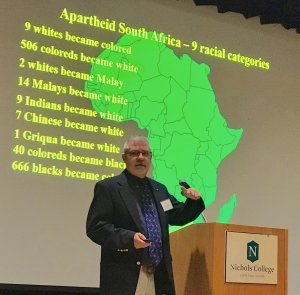Editor’s Note: Hope Rudzinski is a junior English major and communications minor, and a public relations assistant in the Nichols College Office of Marketing and Communications.
By HOPE RUDZINSKI ’20
When it comes to taking risks and living in the moment, Jeffrey K. McKee, Ph.D., isn’t shy to embrace it.
He grew up in Ohio, where he plays an important role as a physical anthropologist at The Ohio State University. And, since the 1980s, he’s extensively worked and studied in South Africa during the era of apartheid, which helped shape him more than anything he’s been involved with in his career. From 1986 to 1996, he served as a senior lecturer in the University of the Witwatersrand Medical School’s Department of Anatomy and Human Biology in Johannesburg.
Dr. McKee’s research into the South African people and culture has led to him to sharing his stories. On Sept. 19, 2018, he chose to share with Nichols College his hands-on experience of witnessing South Africa under the apartheid system. He visited Nichols as apart of Professor Boyd Brown’s Social Justice Speaker Series, sponsored by the Fischer Institute at Nichols and co-sponsored by the Nichols Reads program.
Over the summer, Nichols Reads asks incoming first-year students to read a selected book. During fall semester, they are asked to engage in both curricular and extra-curricular activities through courses such as College Writing and Professional Development Seminar.

Dr. Jeffrey K. McKee speaks to Nichols College students, faculty, and staff about his experience conducting research in apartheid-era South Africa.
Nichols Reads aims to reinforce the value of reading, help students find enjoyment in the novel, and connect the reading with their lives. This year’s selected Nichols Reads book was Born a Crime, a memoir by The Daily Show host Trevor Noah. In the book, Noah describes his life growing up in apartheid-era South Africa. Professor McKee’s experience in South Africa complemented Noah’s memoir and brought a real witness to history to the students.
During his presentation to Nichols students, faculty, and staff, Professor McKee said he was always interested in fossils but never knew where his life would take him with respect to his career.
“I’ve always been interested in human evolution and fossils. I remember when I was 13 years old in my living room watching National Geographic,” he said. “The show came on and was showing the gorges in East Africa, and the host Louis talked about how there are so many steps to take before you reach the top. Meaning before you reach your end-goal, there are numerous steps you have to take before you get there.”
McKee took this inspiration and put it toward everything in his life.
He didn’t know he was going to South Africa until his boss assigned to him a research project there. McKee hesitated at first, but, in the end, he didn’t regret one minute of the experience. Once in South Africa, he and village locals worked together as anthropologists. He embraced life there, as it was different from home. Entering a new belief system, culture, and political climate was tough for Professor McKee, but he always lived life there with respect and kindness.
South Africa’s government dividing people by race was a prominent issue that lead to violent protests and even corrupt government systems, said Professor McKee.
“The only two things I got out of protests were, one, take a pack of cigarettes; and two, protests can change people, but most importantly can change minds,” he said, adding that the protests were so violent that police would teargas people speaking out against the government and threaten them.
The group of villagers McKee worked with only knew white men as being bad to them. As such, when they met McKee, he changed their outlook on race; the villagers treated McKee as if he were one of them. To that end, McKee embraced and fell in love with South Africa’s culture, and from that, the love he had for the country made him want to fight harder to bring equality and justice to the people there.
“The last 10 years, as I went to and from South Africa, shaped who I was,” he said. “It impacted me greatly by just seeing no matter what the people faced, they faced it with respect and fearlessness. Nothing can break human resiliency if you have diligence.”
NICHOLS READS BORN A CRIME
The selection of Born a Crime as this year’s Nichols Reads book was an easy decision, according to Nichols English Professor and Department Chair Kellie Deys, Ph.D., who attended Professor McKee’s lecture.
“We felt the memoir was powerfully written, thought provoking, and just genuinely enjoyable,” she said on behalf of the Nichols Reads committee. “With Noah being a well-known figure as the host of The Daily Show, we thought Born A Crime would connect well with students and invite them to learn about his life and the context in which he frames it.
“Born A Crime offers students many things to reflect on—both in terms of its content and stylistic choices. In terms of the former, it provides a personal account of apartheid era and immediate post-apartheid South Africa,” added Professor Deys. “Noah encourages readers to think about the power of language and to question the concept of ‘race.’ In terms of the latter, students certainly benefit from his story-telling devices; his memoir is rich with details and anecdotes. Born a Crime engages readers with its humor, while depicting a life filled with both challenges and love.”
Noah’s memoir has resonated with Nichols students, such as first-year criminal justice major Brooke Pelley of Townsend, Mass.
“Relationships with parents mean a lot. Trevor Noah’s relationship with his mother is inspiring and very relatable,” she said. “He used a lot of dark humor to lighten up the mood in awkward and or stressful times.”